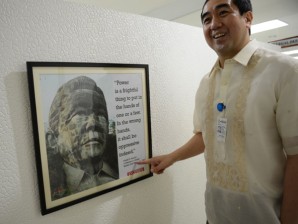Return excess pay, PCGG tells nominees

PCGG Chairman Andres Bautista said the commission had sent out “several” demand letters to government nominees who sat as directors on the boards of sequestered and surrendered companies, ordering them to account for “excessive” salaries and allowances running to hundreds of millions of pesos. AFP/TED ALJIBE
The Presidential Commission on Good Government (PCGG) has begun to go after past PCGG officials and other Malacañang-appointed executives who enriched themselves from companies sequestered from the family and cronies of the late dictator Ferdinand Marcos.
PCGG Chairman Andres Bautista said the commission had sent out “several” demand letters to government nominees who sat as directors on the boards of sequestered and surrendered companies, ordering them to account for “excessive” salaries and allowances running to hundreds of millions of pesos.
“We’re doing that … We’ve sent demand letters for them to give back that which they took,” Bautista said.
He declined to give names but said the commission’s investigation covered government nominees during the previous administrations.
PCGG Commissioner Nelson Acebo said the amount demanded to be returned from the nominees ranged from P20 million to P100 million each.
Article continues after this advertisementAcebo said the amount represented excessive compensation, bonuses and allowances that the government nominee directors had allocated for themselves, as well as substantial cash advances that were never liquidated.
Article continues after this advertisement“So that’s how they committed financial anomalies,” Acebo said.
Bautista said the PCGG was carefully building its case so as not to stretch limited resources and manpower. “Before we file a case we give them a chance to return the money … so whatever case we’ll file will stick,” he said.
Created in 1986 upon the downfall of the Marcos dictatorship, the PCGG is in charge of recovering the ill-gotten wealth of the late strongman, his family and cronies.
The PCGG is also supposed to preserve the sequestered or surrendered companies owned or beneficially owned by the Marcoses and their cronies until a final court judgment on their ownership is rendered.
There are 50 surrendered and sequestered companies with government nominee directors as of January 2011, according to the PCGG.
These included United Coconut Planters Bank (UCPB), Intercontinental Broadcasting Corp. (IBC 13), Chemfields Inc., United Coconut Planters Life Assurance Corp., UCPB General Insurance Inc., CIIF Oil Mills Group, UCPB-CIIF Finance and Development Corp., United Coconut Chemicals Inc., Philcomsat, Independent Realty Corp. and Bataan Shipyard and Engineering Co.
Bautista acknowledged that the abuses of former PCGG officials had eroded the agency’s credibility.
Sabio’s advances
Former PCGG Chairman Camilo Sabio, for instance, has over P2 million in unliquidated cash advances, the PCGG said in a report to the (now aborted) Philippine Truth Commission.
Sabio has also failed to remit P10.35 million in PCGG-collected deposits to the Bureau of the Treasury. The former PCGG head acknowledged having received the amount in the form of cash advances and partial remittances of Mid-Pasig Land Development Corp. to the commission from the proceeds of the sale of Anscor shares in 2006.
During Sabio’s term, the PCGG also misused about $4 million of Philippine National Bank-retained fund for questionable foreign trips.
The current PCGG leadership has recommended to Malacañang that the agency be allowed to “wind down” it operations, saying it was more cost effective for the Department of Justice and the Department of Finance to handle the cases and the sequestered assets, respectively.
President Aquino has not acted on the proposal.
Babysitting cases
“We’re just babysitting cases. We’re just waiting for the results of the cases,” Bautista said, referring to the 291 cases handled by the PCGG in various courts.
He said the commission was not likely to discover new cases of ill-gotten wealth by the Marcoses and their cronies in the country more than 26 years after the Marcos regime was overthrown.
“Aside from the ones abroad, wala na (there’s nothing left) that may be subject to (forfeiture),” he said.
Secret Marcos assets
The PCGG has leads on alleged secret Marcos assets in at least four European countries, but it is carefully weighing the chances of success against the huge cost of litigation, according to Bautista.
“We have to assess the situation so it won’t be a wild goose chase and we won’t be wasting the people’s money,” Bautista said.
Since 1986, the PCGG has turned over P164 billion in ill-gotten wealth of the Marcoses and their cronies to the national coffers.
Under then President Corazon Aquino’s Executive Order No. 1 creating the PCGG, all recovered assets will go to the agrarian reform program.
Bautista said a substantial amount of Marcos’ ill-gotten wealth remained unrecovered, although he acknowledged that he did not know how much more.
The Marcoses are believed to have amassed some $10 billion during the 20-year rule of Marcos.